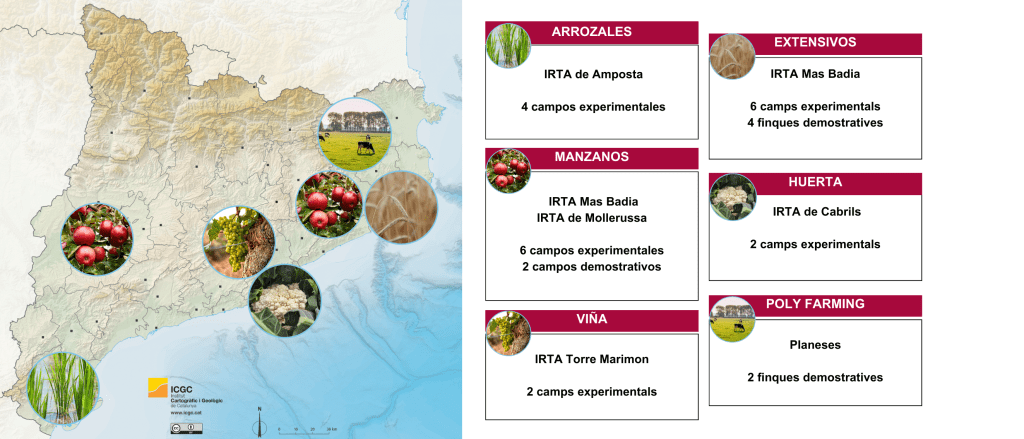Agriculture that restores soil properties, captures carbon and produces high-quality food
At IRTA we research regenerative agriculture because we want to commit to a sustainable agricultural model that reduces greenhouse gas emissions, regenerates both the biodiversity of the fields and the properties of the soils, and is economically profitable for the sector.
To make this possible, we are investigating the techniques that define the principles of regenerative agriculture:
Avoid plowing the fields
By reducing the tillage of agricultural soils, carbon sequestration is promoted while protecting the soil from erosion and increasing biodiversity.
Maintain a permanent plant cover throughout the year
Covering the soil with plants and porous mulches improves water and nutrient retention, increases its biodiversity and protects it from erosion.
Promote biodiversity in the fields
Crop diversification, plant cover and the creation of habitats for pollinators and natural enemies of pests enhance biodiversity.
Incorporate pastures
The integration of livestock through rotational grazing enriches the soil with organic matter and optimizes nutrient cycles in agricultural ecosystems.
Optimize crop waste management
Crop residues, such as pruning residues or stubble, are used to provide organic matter to the soil, to improve its fertility and to conserve its moisture for a longer time. In addition, this practice promotes carbon sequestration and improves its structure.



“Regenerative agriculture offers the opportunity to ensure the production of quality food for present and future generations.”
Dr. Georgina Alins


At IRTA we are developing the Regenerative Agriculture ( AgriRegenCat ) and Carbon Agriculture in Catalonia ( AgriCarboniCat ) projects, funded by the Generalitat de Catalunya through the Climate Fund to improve the resilience of crops to climate change.
To this end, our objectives are:
1) Investigate and identify the best techniques for regenerative agriculture and carbon in order to expand knowledge within this field of research.
2) Transfer scientific knowledge to the technical sector so that the most productive and economically and environmentally sustainable regenerative agriculture practices can be applied.
3) Disseminate and disseminate to the non-specialized public what regenerative agriculture is and highlight the benefits of consuming sustainable foods.
Through research into regenerative agriculture practices, we want to lead the transition towards a more sustainable agricultural future, providing practical and economically viable solutions.

Biodiversity
We characterize the soil microbiome, soil and aerial invertebrates (pollinators and natural enemies of pests) as well as floral diversity.

Soil quality and health
We analyze soil structure and quality, including organic matter and nutrient content, water retention capacity, carbon stock, and carbon sequestration potential.

Greenhouse gases
We quantify greenhouse gas emissions to identify agricultural practices that optimize the carbon balance; that minimize emissions and maximize carbon sequestration.

Life cycle analysis
We calculate the effectiveness of different agricultural practices in reducing environmental impact, promoting sustainability and carbon balance and footprint.

Production
We monitor field production to evaluate the profitability of regenerative agriculture and carbon sequestration practices.

“Sequestering carbon in the soil reduces the excess concentration of greenhouse gases in the atmosphere and contributes to the mitigation of climate change by the agricultural sector.”
Dr. Martínez Eixarch
We have a network of demonstration farms and experimental fields in regenerative agriculture and carbon agriculture throughout Catalonia.
There we investigate best practices in the most representative crops of the territory: extensive crops , rice , apple trees , vineyards and vegetable gardens .
Distribution of experimental fields and demonstration farms:

The main experiments and research activities we carry out at these locations are:

From IRTA we coordinate the projects, and we have the participation of CREAF and the University of Lleida.



More than 30 people distributed throughout Catalonia participate in these projects:

The projects are coordinated by:
Dr. Georgina Alins
IRTA researcher and coordinator of the AgriRegenCat project
georgina.alins@irta.cat
Dr. Maite Martinez Eixarch
IRTA researcher and coordinator of the AgriCarboniCat project
maite.martinezeixarch@irta.cat
For more information, collaborations or other questions, you can contact us through the email of the project manager: nuria.bentoldra@irta.cat.
Or with the dissemination responsible: ariadna.ferrer@irta.cat.